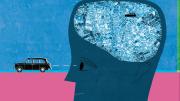San Francisco Zen Center was founded by Shunryu Suzuki, and his Dharma heir was Richard Dudley Baker '58. Once at the hot core of the counterculture, the Zen Center acquired prestige, wealth, and property; its holdings included, for instance, the upscale vegetarian restaurant Greens. Then an apocalyptic sex scandal in 1983 saw Baker accused of abusing his power and spiritual authority. In a fascinating report, Shoes outside the Door: Desire, Devotion, and Excess at San Francisco Zen Center (Counterpoint Press, $26), Michael Downing '80 explores the history of the first Buddhist monastery established outside of Asia and of its Zen master leader, Baker.
He took his mother's maiden name as his middle name, claiming from her a distinguished lineage. ("My eighth great grandfather Dudley gave the land for Harvard. He was always angry and had a big nose. There was always a feeling of connection with Harvard.") Richard got the old man's nose, but the Dudleys who preceded him got rid of the family fortune.
Richard is forthcoming with the details of his youth; however, he interrupts himself in the midst of every anecdote, abandons stories in mid-sentence, and his digressions and circumlocutions muddle and overwhelm the facts until you feel you are trapped in a car with a man who is determined to show you his childhood home in a neighborhood that evidently does not conform to his memory. You back out of the same dead end often enough, and you begin to suspect that he's hoping you will claim to have seen his house a few miles back so he can head for the highway and you can both get the hell out of town....
Richard's self-portraits are all sketchy, but they clearly suggest a Byronic temperament. He loved literature, and poetry especially; he admired artists, none more so than poets. ("I had experiences in high school--some kind of ecstatic experience, which is, I think, at the root of many writers' poetry.") He was nocturnal, with a precocious flair for staging dark nights of the soul. ("When I was five, my grandmother's house had burned partially down, mostly because my grandfather did all the wiring, but, anyway, I decided I should protect my family. I would wait till they all went to bed, and I would get up and go out and walk around the house to make sure it wasn't burning. My father finally decided I should see a psychiatrist.") He sees himself sneaking into museums at night through steam tunnels, sleeping on the gated lawn of a hospital ("it was kind of a meditative experience, with the stars; I'd sleep a great kind of intense sleep"), and perching on roofs at Harvard. ("I used to spend a lot of time running around--you know those Georgian banisters on the edge of the roofs?--I'd go out and run in the night dressed in black, and leap across the corners of the roof. I loved being on the height. I loved being on the edge. I'd be up on the roofs all over Harvard Square. I'd just sit there and look at things and feel the lights and the night. Happy to be alone. Kind of mixed up.")...
"Dick let me know his family," says Yvonne [Rand]. "He introduced me to his sister, who later killed herself. Another sister barely managed to stay sane by having no contact with the rest of the family. And one time I went with him and spent three days with his mother....I said to him, 'She is a textbook case of a schizophrenogenic.' He said, 'What's that?' I said, 'That means crazy-making.' And that was the end of the conversation."





